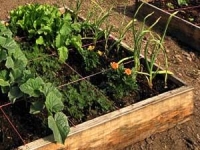Do you have a vegetable garden and you want to optimize its yield? Or are you just getting started in growing vegetables for your own personal pleasure? This article is made for you !
To have a kitchen garden worthy of the name, it is not enough to plant your favorite vegetables above and beyond. Some plants will marry each other while others will harm each other if planted side by side.
Remember to vary
The first rule is to practice work-study (and I'm not talking about politics ... though). By cultivating the same plant from year to year, the quality of the soil will be impaired. The vegetables will consume the nutrients necessary for their growth and they will then decrease more and more for the following plantings. Each plant having a different and more or less important need, by alternating cultivated plants, you will ensure the good performance of your soil. This alternation practice is called rotation.

Organization of the vegetable garden
Each plant needs and rejects different nutrients. It is considered that there are 3 types of vegetables:
- Root vegetables (carrot, turnip ...): they go wonderfully with bulb vegetables (onion, leek, garlic ...).
- Grain vegetables (lentils, beans, peas): they have the particularity of fixing nitrogen from the air on their roots.
- Leafy vegetables (salad, cabbage, spinach, etc.): they have a huge need for nitrogen and are very friendly with nightshades (potatoes, tomatoes, etc.).
The ideal will be to organize your vegetable garden in several zones or districts. On each zone, assign one of the 3 types of vegetables defined previously. Each year and in each zone you will then alternate the type of vegetable. On the area or areas where the root vegetables were, you will plant grain vegetables. On the area (s) with grain vegetables, you will plant leafy vegetables. After growing leafy vegetables, plant root vegetables or let the soil rest for a year. It is preferable, every 4 years, to let the soil rest by sowing a suitable fertilizer. So you will always benefit from an optimal yield from your vegetable garden.
Harvest, prepare and taste!

